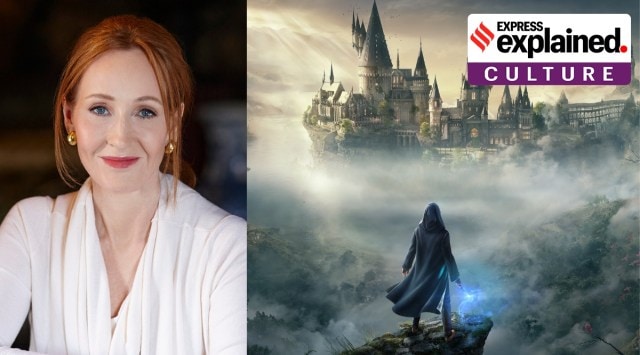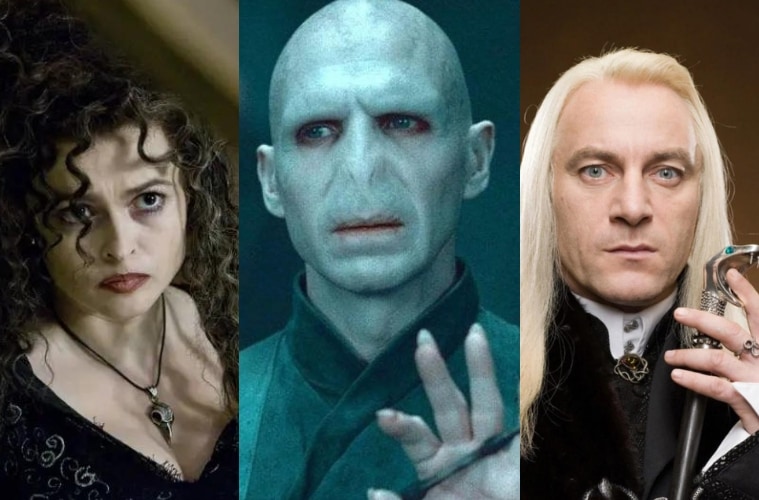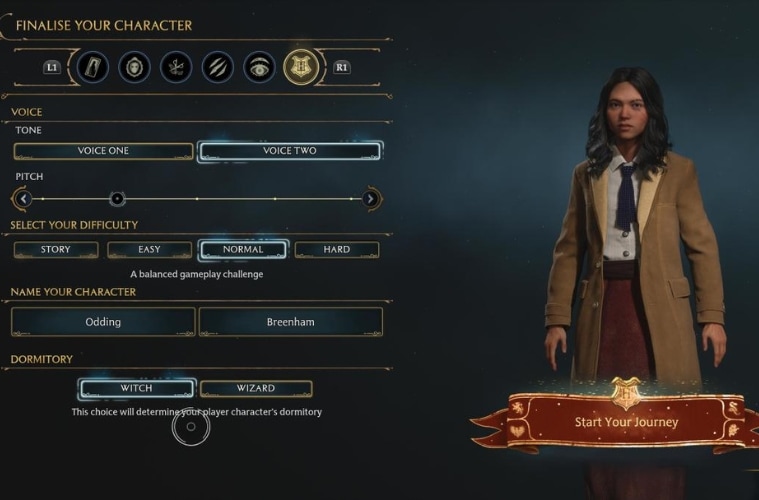Latest Comment
Post Comment
Read Comments
 Many Harry Potter fans have called for a boycott of the game to show support for the trans community, while others are in an ethical quagmire about buying it, as Rowling stands to earn sales royalties. (Photos: Debra Hurford Brown/JKRowling.com; Warner Bros. Entertainment Inc)
Many Harry Potter fans have called for a boycott of the game to show support for the trans community, while others are in an ethical quagmire about buying it, as Rowling stands to earn sales royalties. (Photos: Debra Hurford Brown/JKRowling.com; Warner Bros. Entertainment Inc) Within a day of its launch, ‘Hogwarts Legacy’ is set to demolish video game records. Set in the 1800s, the immersive RPG has been riding the millennial nostalgia wave in its promotions—presales numbers hit close to 500,000—and since its debut on February 10, has hit a peak of 870,000-plus players on Steam. Combine that with hidden figures for Xbox and PlayStation consoles, and the title must have already sold over a million copies. It’s a best-seller in the making—so why is there a culture war brewing behind it?
The problem—one that’s unlikely to go away—is the outspoken political stances held by Wizarding World creator JK Rowling, which many see as anti-transgender. Many Harry Potter fans have called for a boycott of the game to show support for the trans community, while others are in an ethical quagmire about buying it, as Rowling stands to earn sales royalties.
However, given the game’s success, both of these groups appear to be in the vocal minority. Most fans and gamers seem either unaware or indifferent to Rowling’s politics—’Hogwarts Legacy’ is enjoying a ‘Very Positive’ rating on Steam, with over 49,000 reviews.
What is Rowling’s role in the controversy?
Over the years, Rowling has made several comments against trans persons’ right to self-identification, for which she has received continued public backlash, and also been labelled a Trans Exclusionary Radical Feminist (TERF). While the author asserts that she supports the community, her repeated tweets and actions around the topic seem to contradict this. Critics say that she does not accept the difference between sex and gender, which plays a core role in why transgender people choose to transition.
 The broad differences between sex and gender, as viewed by health practitioners. (Source: Office on Research on Women’s Health, US NIH)
The broad differences between sex and gender, as viewed by health practitioners. (Source: Office on Research on Women’s Health, US NIH)
As a resident of Edinburgh, Rowling spoke out last year against Scotland’s Gender Reform Bill, which sought to make gender recognition an easier process for trans individuals. She also founded Beira’s Place, a ‘women-only’ centre for survivors of abuse, which does not permit trans staff or provide care for trans survivors. This exclusion is in contrast to the 17 centres of Rape Crisis Scotland, the country’s largest charity in this domain, which provides care to both biological and trans women.
Rowling’s views on this topic are informed by her own lived experience as a survivor of sexual violence, which she revealed in a 3,600-word essay in 2020. “I’m extraordinarily fortunate; I’m a survivor, certainly not a victim,” wrote Rowling, who ended the piece with apparent self-awareness on her motivations. “I’ve only mentioned my past because, like every other human being on this planet, I have a complex backstory, which shapes my fears, my interests and my opinions.”
Does the Harry Potter cast support Rowling?
Not exactly—the cast has a generational split on how they’ve handled the topic.
Daniel Radcliffe, Emma Watson, and Rupert Grint, who played the ‘Golden Trio’ of Harry Potter, Hermione Granger and Ron Weasley, have publicly distanced themselves from Rowling’s stance. Radcliffe also apologised to fans who were hurt by her comments.
Eddie Redmayne, who plays Newt Scamander in the ‘Fantastic Beasts’ spinoffs, told Variety, “As someone who has worked with both JK Rowling and members of the trans community, I wanted to make it absolutely clear where I stand. I disagree with Jo’s comments. Trans women are women, trans men are men and non-binary identities are valid.”
 Notable members of the senior cast have not taken a stand for or against Rowling’s views. (Photo sources: Warner Bros)
Notable members of the senior cast have not taken a stand for or against Rowling’s views. (Photo sources: Warner Bros)
Senior cast members such as Helena Bonham Carter (Bellatrix Lestrange) and Ralph Fiennes (Voldemort) have not shared their position, but have defended Rowling’s right to voice her opinion. Jason Isaacs, who plays Lucius Malfoy, felt that it was important to focus on the “good” Rowling has done over the years as a philanthropist, though he did not mirror her views.
“One of the things that people should know about her too — not as a counter-argument — is that she has poured an enormous amount of her fortune into making the world a much better place, for hundreds of thousands of vulnerable children, through her charity Lumos,” Isaacs told The Telegraph.
Diversity and trans inclusion in ‘Hogwarts Legacy’
Warner Bros owns the film rights to Harry Potter, and they are also the publisher behind ‘Hogwarts Legacy’ via the studio Avalanche Software. With negative PR swirling since Rowling’s essay, Warner Bros has clarified their position in the past as one of “inclusiveness” and “empathy”.
Within the game, players have no restrictions on how they can mix male or female traits while designing their characters—think body types, vocal tones, general appearance—with a choice to pick ‘witch’ or ‘wizard’ appearing only at the end.
 The in-game character creator for Hogwarts Legacy. Players get their dormitory depending on whether they choose to be a ‘Witch’ or ‘Wizard’. (Source: Warner Bros)
The in-game character creator for Hogwarts Legacy. Players get their dormitory depending on whether they choose to be a ‘Witch’ or ‘Wizard’. (Source: Warner Bros)
‘Hogwarts Legacy’ also debuts the Wizarding World’s first openly trans character, a bartender named Sirona Ryan who works at the Three Broomsticks in Hogsmeade village. Despite their limited screen time, the choice to let Sirona share their transition story is being seen as a ‘polite pushback’ by Avalanche against Rowling’s politics.
The ‘moral midpath’ for conflicted Potterheads
In the three ideological camps surrounding ‘Hogwarts Legacy’, the fans calling for boycott are determined not to play the game as a show of allyship to the trans community.
On the other hand, those choosing to buy copies are either in active support of Rowling’s views, or indifferent to her stance. The latter claim that their choice to play doesn’t diminish their support for trans rights, and/or that they wish to honour the four-and-a-half-year effort Avalanche has put into the title.
For those stuck in the middle, one of the answers will likely be piracy—where fans can enjoy the game’s experience without adding to Rowling’s bank account. ‘Cracked’ versions of AAA games (ones that are high-profile, high-budget) tend to crop up on piracy forums within a few months, and if Reddit is to be believed, a prolific user named Empress is on the job to provide a free version by next week. However, Warner Bros has integrated anti-tampering software Denuvo into the game to protect sales, so this is easier said than done.
 Players riding hippogriffs in the game, which are rare mythical creatures. (Source: Warner Bros)
Players riding hippogriffs in the game, which are rare mythical creatures. (Source: Warner Bros)
Regardless of which camp one might fall into, the yearning for an immersive game like ‘Hogwarts Legacy’ has been long and deep from two generations of fans. The themes in Harry Potter—of domestic abuse and being an outcast, of moral quandaries and found families—mimic the real-life discrimination faced by trans individuals and the LGBT community. Players, and Rowling, are unlikely to give up this conversation any time soon.